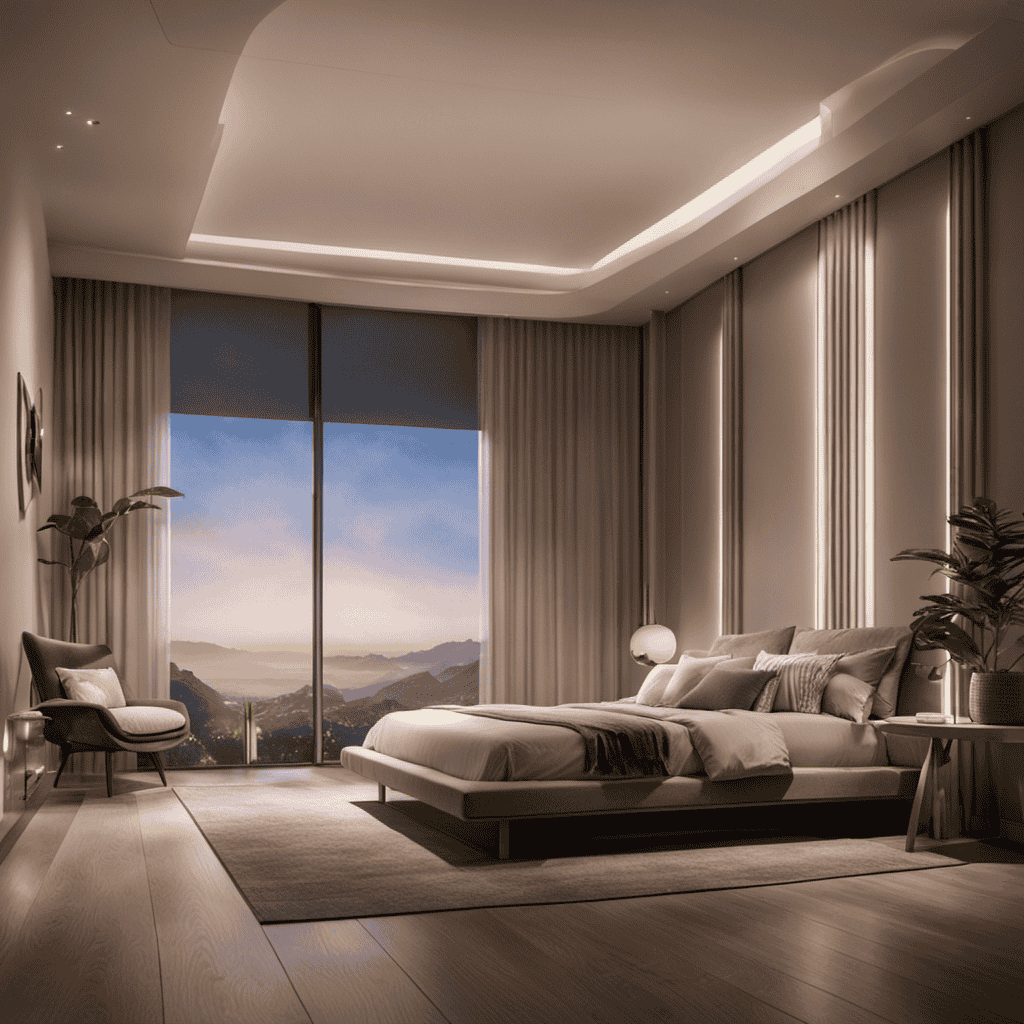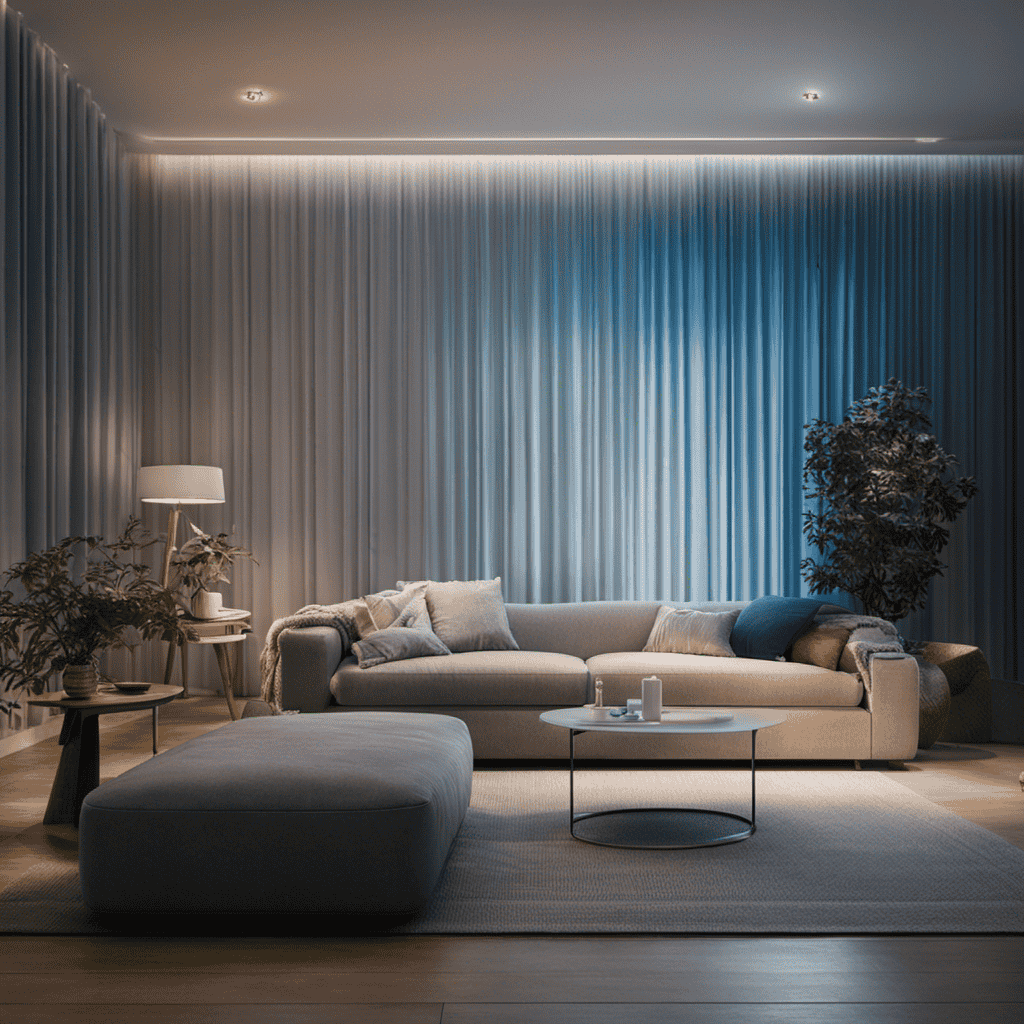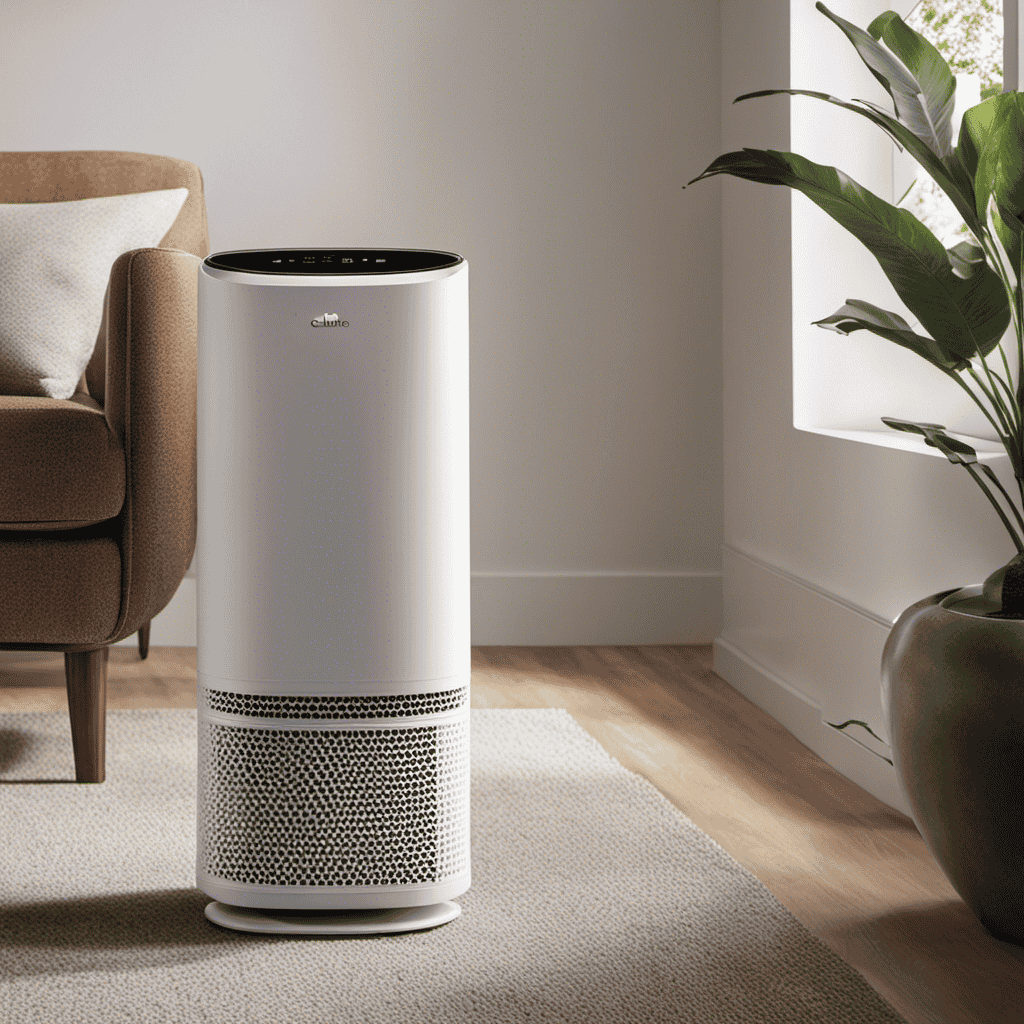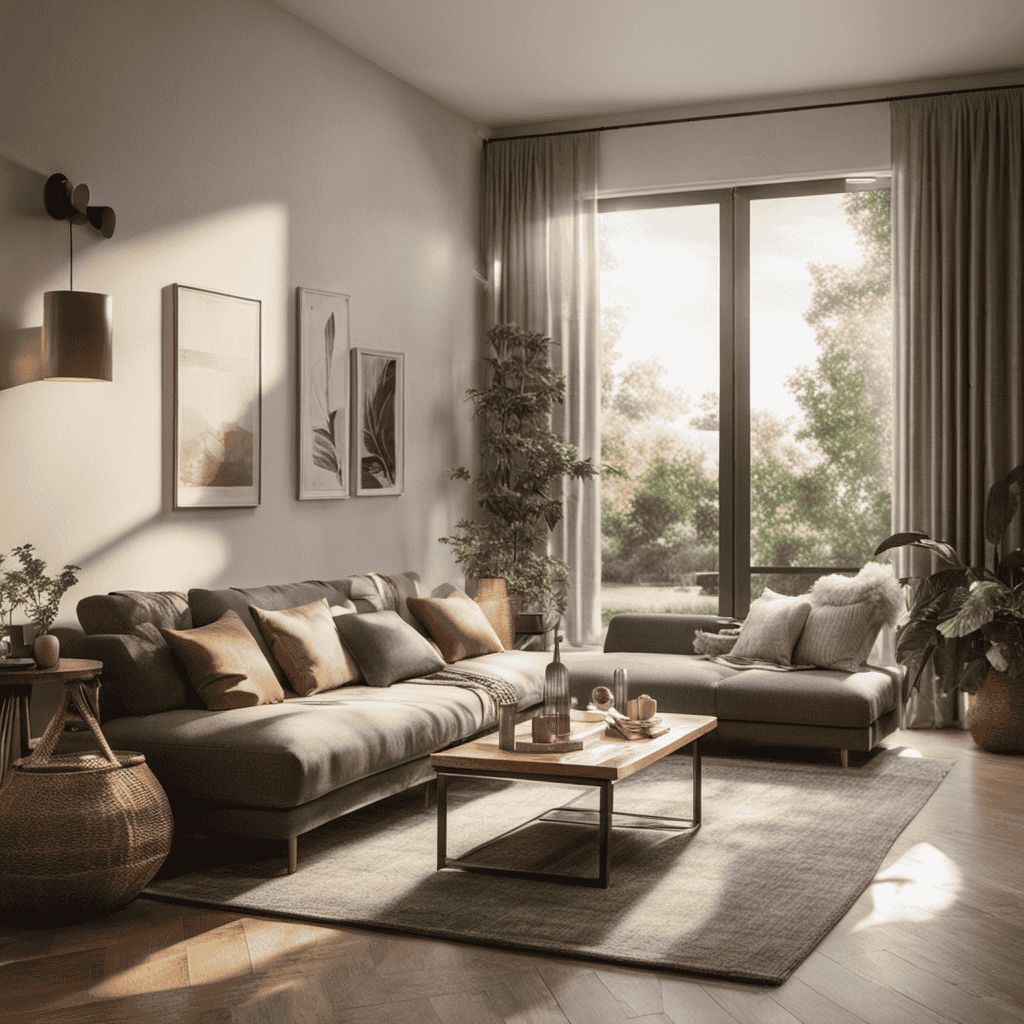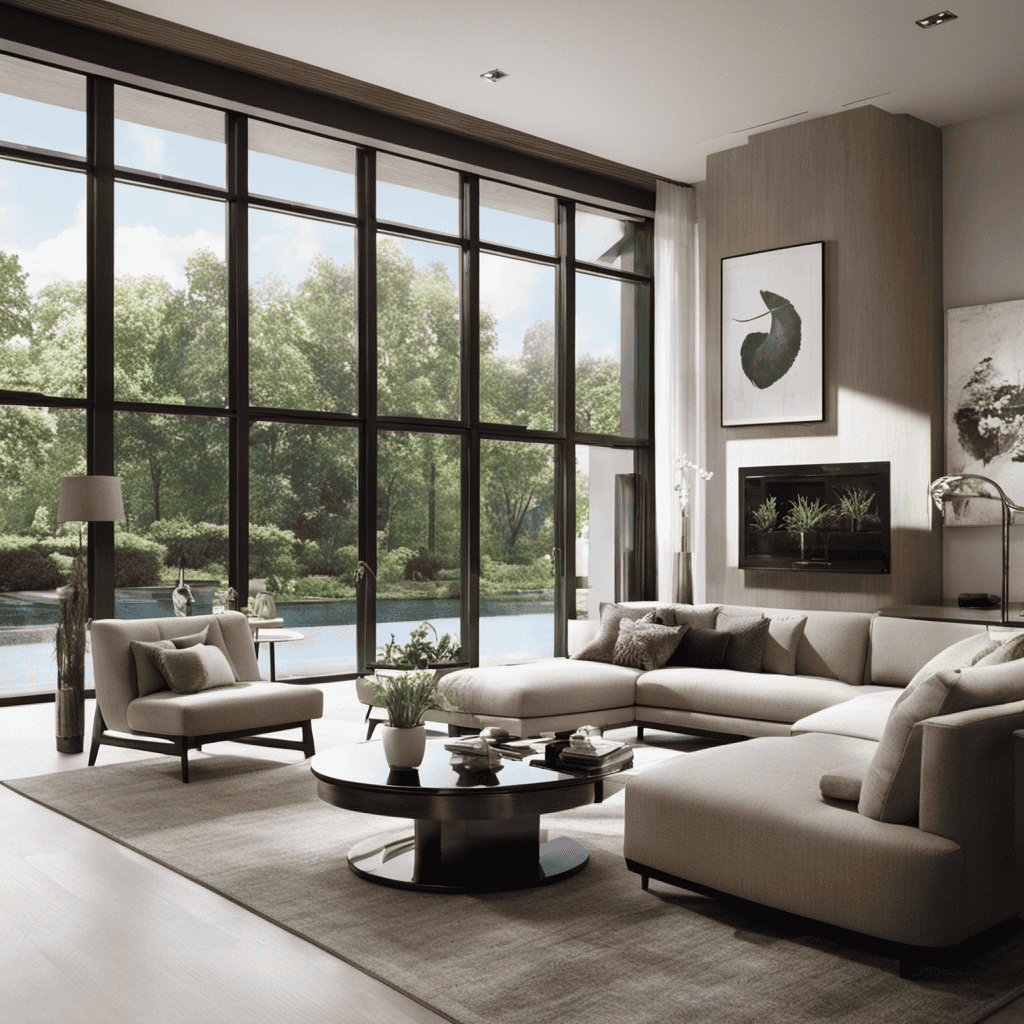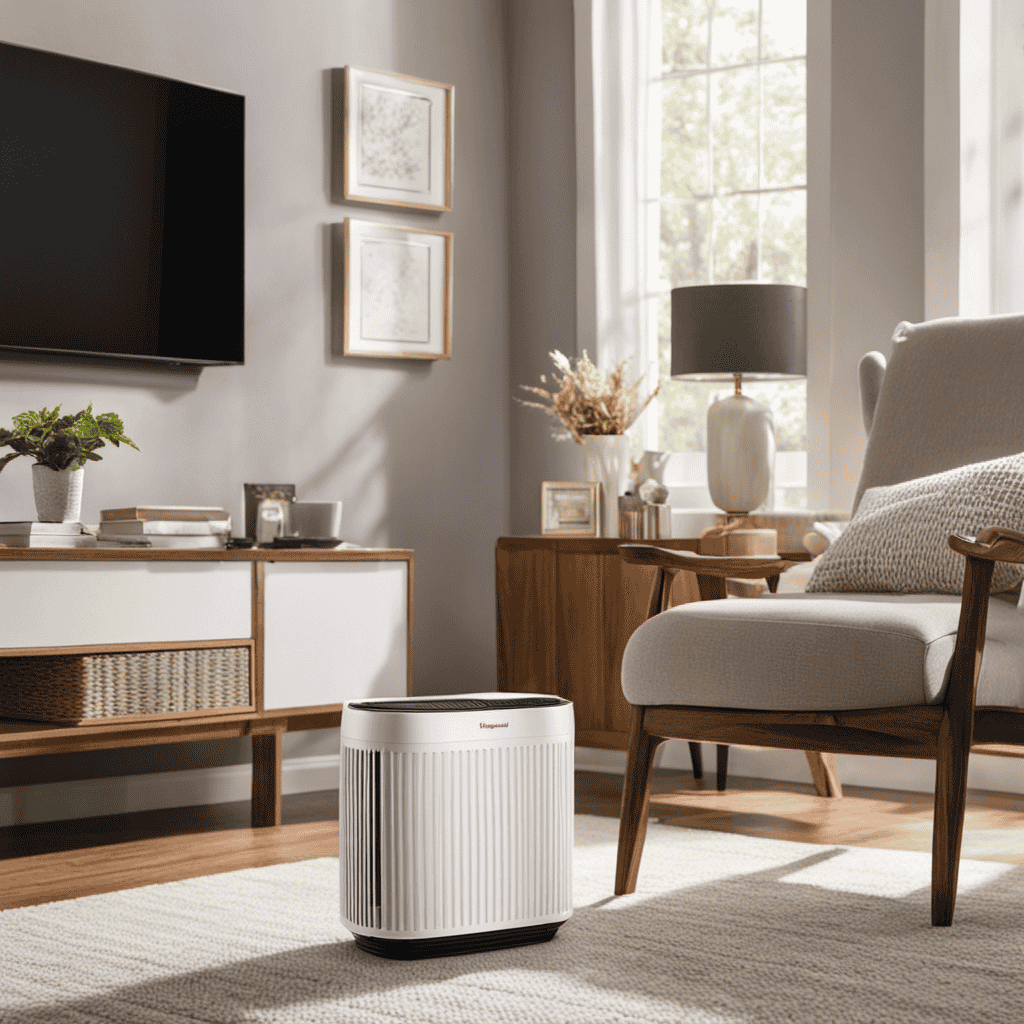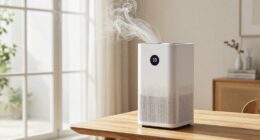I have always been curious about the optimal duration for running my air purifier daily to maintain the highest air quality in my home. Through some research, I have come across some fascinating discoveries that I will be discussing in this article.
For example, did you know that the recommended minimum time to keep an air purifier on each day is around 8 hours? But, there are also factors like room size and indoor air quality that need to be considered.
So, let’s dive in and explore the optimal duration for air purifier usage!
Key Takeaways
- The recommended duration for running an air purifier is 8 to 12 hours a day.
- The optimal daily usage of an air purifier is a few hours to maximize health benefits and minimize energy consumption.
- Using an air purifier for a few hours daily improves indoor air quality, reduces the risk of respiratory issues, and removes harmful pollutants and allergens.
- Be mindful of the maximum duration for continuous use, as most manufacturers recommend 8 to 12 hours a day, considering factors such as room size, pollution levels, and the specific model of the air purifier.
Factors to Consider When Determining Air Purifier Usage Duration
When deciding how long to keep your air purifier on, there are a few factors you should consider.
The recommended duration for running an air purifier is typically around 8 to 12 hours a day. This provides enough time for the purifier to effectively clean the air in your space.
However, the actual duration may vary depending on factors such as the size of the room, the level of pollution, and the specific needs of individuals in the space.
It’s important to note that running your air purifier continuously may not necessarily provide additional benefits and can significantly impact your electricity bill.
Therefore, it’s crucial to strike a balance between air purification and energy consumption to ensure both clean air and cost-effectiveness.
Recommended Minimum Time to Keep Air Purifier on Each Day
When it comes to optimal daily air purifier usage, understanding the health benefits and duration is crucial.
By using an air purifier for the recommended minimum time each day, you can reap the maximum benefits for your health.
The duration of air purifier usage is directly linked to its effectiveness in removing pollutants and improving indoor air quality.
Optimal Daily Air Purifier Usage
To maximize the health benefits of an air purifier while minimizing energy consumption, it’s best to use the device for a few hours every day.
Air purifiers are designed to remove pollutants and allergens from the air, improving indoor air quality and reducing the risk of respiratory issues.
By running the air purifier for a few hours daily, you can ensure that the air in your home remains clean and fresh. This duration allows the purifier to effectively filter the air without consuming excessive amounts of energy.
It’s important to note that the specific duration may vary depending on factors such as room size and pollutant levels. However, maintaining a regular daily usage routine will help you experience the full health benefits of an air purifier.
Health Benefits and Duration
Using an air purifier for a few hours daily can improve indoor air quality and reduce the risk of respiratory issues.
Regular use of an air purifier has several health benefits. Firstly, it helps to remove harmful pollutants such as dust, pollen, pet dander, and mold spores from the air, which can trigger allergies and asthma. By reducing these irritants, an air purifier can alleviate symptoms and provide relief.
Additionally, air purifiers can capture and neutralize volatile organic compounds (VOCs) and other harmful chemicals that may be present in the air. This can be particularly beneficial for individuals with sensitivities or compromised immune systems.
To reap these health benefits, it is recommended to use an air purifier for at least a few hours every day. However, the maximum duration for continuous use of an air purifier is dependent on various factors, which will be discussed in the next section.
Maximum Duration for Continuous Use of an Air Purifier
You should be mindful of the maximum duration for continuous use of an air purifier. While air purifiers offer numerous health benefits by removing airborne pollutants and allergens, it is important to adjust the runtime to ensure optimal performance and avoid potential issues.
Most manufacturers recommend running an air purifier for 8 to 12 hours a day, allowing it to effectively clean the air in your space. However, it is essential to consider the size of the room, the level of pollution, and the specific model of the air purifier.
Some advanced air purifiers have built-in sensors that automatically adjust their runtime based on the air quality. It is also crucial to regularly clean or replace the filters to maintain the efficiency of the purifier.
How Long to Run an Air Purifier in Different Room Sizes
When it comes to optimal purifier runtime, it is important to consider the size of the room. Different room sizes will require different running times to effectively clean the air.
Additionally, energy-saving strategies can be implemented to ensure efficient use of the air purifier, minimizing energy consumption without compromising air quality.
Optimal Purifier Runtime
To achieve optimum air purification, it’s important to determine the ideal runtime for your purifier. Finding the recommended runtime will ensure that you maximize the effectiveness of your air purifier while also minimizing energy consumption.
Here are four factors to consider when adjusting usage:
-
Room size: Larger rooms may require longer runtime to circulate and clean the air thoroughly.
-
Air quality: If the air in your space is particularly polluted, you may need to run the purifier for a longer period to achieve desired results.
-
Sensitivity to allergens: If you or someone in your household has allergies or respiratory issues, a longer runtime may be necessary to maintain a clean and healthy environment.
-
Time spent in the room: Consider the amount of time you spend in the room. Adjust the runtime accordingly to ensure continuous air purification when you are present.
Room Size Considerations
Consider the size of your room when determining the ideal runtime for optimal air purification. The size of the room plays a crucial role in determining how long you should keep your air purifier on. A larger room with more square footage will require a longer runtime to effectively clean the air. On the other hand, a smaller room may need a shorter runtime. To help you determine the ideal runtime for your specific room size, refer to the table below:
| Room Size | Ideal Runtime |
|---|---|
| Small | 4-6 hours |
| Medium | 6-8 hours |
| Large | 8-10 hours |
| Extra Large | 10-12 hours |
| Open Space | 12+ hours |
Placement of the air purifier within the room is also important. It is recommended to place the air purifier in a central location for optimal air circulation. Additionally, consider noise level considerations when deciding how long to keep the air purifier on. Some air purifiers have a noise level indicator that can help you determine the appropriate runtime without causing disruption. Now, let’s explore energy-saving strategies to maximize the efficiency of your air purifier.
Energy-Saving Strategies
To save energy with your air purifier, make sure you adjust the fan speed according to the level of air pollution in the room. Here are some energy-saving techniques and expert recommendations to help you maximize the efficiency of your air purifier:
-
Use the lowest fan speed setting when the air quality is good. This will help conserve energy while maintaining a clean and healthy environment.
-
Increase the fan speed to a medium setting when the air pollution level is moderate. This will ensure effective filtration without consuming excessive energy.
-
During high pollution episodes, such as during wildfires or heavy smog, you can set the fan speed to its highest setting. This will provide maximum air purification and help protect your indoor air quality.
-
Consider using the timer function on your air purifier to automatically turn it off when you don’t need it, such as when you’re asleep or away from home. This will further reduce energy consumption and save you money in the long run.
Adjusting Air Purifier Usage Based on Indoor Air Quality
You should adjust your air purifier usage based on the indoor air quality. Different levels of indoor pollution require different amounts of time for the air purifier to effectively clean the air. To help you understand how long to run your air purifier, I have created a table below that outlines recommended air purifier runtime based on indoor pollution levels.
| Indoor Pollution Level | Recommended Air Purifier Runtime |
|---|---|
| Low | 2-4 hours per day |
| Moderate | 6-8 hours per day |
| High | 10-12 hours per day |
| Severe | 24 hours per day |
How Long to Keep Air Purifier on During Specific Activities
When it comes to sleeping with an air purifier, it can provide numerous benefits for a better night’s rest.
The air purifier helps to remove pollutants and allergens from the air, creating a cleaner and healthier environment to sleep in.
Additionally, using an air purifier while cooking can effectively eliminate cooking odors and reduce the presence of harmful fumes and particles in the air.
Lastly, using an air purifier during cleaning can greatly improve indoor air quality by capturing dust, pet dander, and other airborne particles that are stirred up during the cleaning process.
Sleeping With Air Purifier
If you’re sleeping with an air purifier, it’s important to keep it on for the entire night. Here are 4 reasons why you should do so:
-
Maintaining Indoor Air Quality: While we sleep, our bodies are in a state of rest and repair. By leaving the air purifier on, it continuously filters out pollutants, allergens, and dust particles, ensuring cleaner air for us to breathe.
-
Reducing Allergy Symptoms: Many people suffer from allergies that can be triggered during the night. An air purifier removes allergens like pollen, pet dander, and dust mites from the air, providing relief from symptoms such as sneezing, congestion, and itchy eyes.
-
Promoting Better Sleep: The white noise generated by an air purifier can help drown out disruptive sounds, creating a more peaceful sleep environment. The improved air quality also reduces the risk of breathing issues, allowing for a deeper and more restful sleep.
-
Preventing Morning Congestion: Waking up with a stuffy nose is not pleasant. Keeping the air purifier running throughout the night helps minimize congestion by capturing airborne irritants, allowing you to wake up feeling refreshed and clear-headed.
Transitioning to the next section, let’s explore the benefits of using an air purifier while cooking.
Air Purifier While Cooking
While cooking, it’s essential to have the air purifier running to remove smoke, odors, and airborne particles from the kitchen. Air purifiers are highly effective in improving indoor air quality by capturing and trapping pollutants.
However, to maintain their effectiveness, regular maintenance is necessary. It is recommended to clean or replace the filters every three to six months, depending on the manufacturer’s instructions. This ensures that the air purifier continues to efficiently remove contaminants from the air.
Additionally, it’s important to keep the air purifier in a well-ventilated area to prevent the accumulation of dust and debris on the unit. Regularly wiping down the exterior of the purifier can also help to maintain its performance.
Air Purifier During Cleaning?
When it comes to air purifier maintenance, keeping your device clean is crucial for optimal performance. Regular cleaning ensures that your air purifier continues to effectively remove airborne pollutants from your indoor environment.
The frequency of cleaning your air purifier depends on various factors, including the manufacturer’s recommendations and the level of pollutants in your home. Here are some guidelines to help you determine how often you should clean your air purifier:
-
Check the manufacturer’s instructions: Different air purifier models may have specific cleaning guidelines, so it’s important to consult the manufacturer’s instructions for recommended maintenance.
-
Monitor the filter: Most air purifiers have filters that need to be cleaned or replaced regularly. Check the filter regularly and clean or replace it as needed to maintain optimal performance.
-
Assess the air quality: If you live in an area with high levels of pollutants or have pets or smokers in your home, you may need to clean your air purifier more frequently to keep it working effectively.
-
Regular maintenance schedule: It’s a good idea to establish a regular maintenance schedule for your air purifier, such as cleaning it once every few months, to ensure that it continues to operate efficiently.
Optimal Air Purifier Operation Time for Allergy Relief
To achieve optimal allergy relief, you should consider keeping your air purifier on for at least 8 hours a day. Extending the operation time of your air purifier can provide several benefits. Firstly, it ensures that the air in your home remains continuously filtered, reducing the presence of allergens such as dust, pollen, and pet dander. Secondly, prolonged usage allows the air purifier to cycle the air multiple times, increasing its efficiency in capturing and eliminating pollutants. Lastly, extended operation time helps maintain a constant level of clean air, preventing allergens from accumulating and triggering allergic reactions.
Here is a table summarizing the benefits of extended air purifier usage:
| Benefits of Extended Air Purifier Usage |
|---|
| Continuous filtration of allergens |
| Increased efficiency in capturing pollutants |
| Maintains a constant level of clean air |
Balancing Energy Consumption and Air Purification Effectiveness
When it comes to air purifiers, finding the optimal purification duration is essential for balancing energy consumption and effectiveness.
Determining the right amount of time to run your air purifier ensures that you are not wasting energy while still maintaining clean and healthy indoor air.
In this discussion, we will explore energy-saving techniques and strategies that can help you maximize the efficiency of your air purifier without compromising on air quality.
Optimal Purification Duration
You should consider keeping the air purifier on for the optimal duration to ensure effective purification. Here are 4 key points to consider when determining the recommended purifier runtime and the impact of air purifier usage on electricity bills:
-
Size of the room: The larger the room, the longer the air purifier should be kept on to thoroughly clean the air. This is because a larger space requires more time for air circulation and filtration.
-
Air quality: If the air quality is particularly poor, such as during a wildfire or in a highly polluted area, it is advisable to keep the air purifier on for longer periods to continuously filter out harmful pollutants.
-
Allergies or respiratory issues: If you or someone in your household suffers from allergies or respiratory issues, it is recommended to keep the air purifier on for extended periods, especially during peak allergy seasons or when symptoms are more severe.
-
Energy-saving features: Some air purifiers have energy-saving modes or timers that allow you to set specific durations for operation. Utilizing these features can help minimize the impact on electricity bills while still maintaining effective purification.
Energy-Saving Techniques
Using energy-saving modes or timers on your air purifier can help minimize electricity costs while maintaining effective purification. By implementing these energy-saving techniques, you can adjust the usage of your air purifier based on the indoor air quality, thus optimizing its performance and reducing unnecessary power consumption.
To better understand how to save energy while using your air purifier, refer to the table below:
| Energy-Saving Technique | Description |
|---|---|
| Sleep Mode | Reduces fan speed and noise level during nighttime or when the room is unoccupied. |
| Timer Settings | Allows you to set specific operating hours for your air purifier, saving energy when you don’t need it. |
| Smart Sensors | Automatically adjusts the purification intensity based on the detected air quality, maximizing energy efficiency. |
| Power-Saving Mode | Lowers power consumption by reducing the purifier’s performance while still maintaining a basic level of air purification. |
| Filter Replacement Alert | Notifies you when it’s time to replace the air purifier’s filter, ensuring optimal performance without wasting electricity. |
Expert Recommendations for Air Purifier Usage Duration
To maximize the effectiveness of your air purifier, experts recommend keeping it running for at least 6 hours a day. This recommended duration ensures that the air in your home is constantly being filtered and purified, providing you with optimal health benefits.
Here are four reasons why maintaining this usage duration is crucial:
-
Continuous purification: Running the air purifier for at least 6 hours allows it to continually filter the air, removing pollutants such as dust, pollen, and pet dander.
-
Allergen reduction: Extended usage helps reduce allergens in the air, providing relief to individuals suffering from allergies or asthma.
-
Odor elimination: Keeping the air purifier on for a sufficient amount of time helps eliminate unpleasant odors caused by cooking, pets, or smoking.
-
Improved sleep quality: Running the air purifier during the night can help create a clean and fresh environment, promoting better sleep and overall well-being.
How Often to Run an Air Purifier for Optimal Results
For optimal results, it’s recommended to run your air purifier consistently throughout the day. This ensures that the air in your home is continuously filtered, providing you with the maximum health benefits.
Air purifiers work by removing pollutants, allergens, and other harmful particles from the air, improving indoor air quality. By running the purifier continuously, you can effectively reduce the presence of these contaminants, leading to a cleaner and healthier environment.
However, the duration of running the air purifier can be adjusted based on your specific needs and circumstances. If you have severe allergies or live in a highly polluted area, you may need to run the purifier for longer periods. On the other hand, if you have a smaller space or fewer contaminants, you can adjust the duration accordingly.
Remember to clean or replace the filters regularly to maintain the purifier’s effectiveness.
Air Purifier Usage Duration for Different Types of Pollutants
If you want to effectively reduce different types of pollutants in your home, adjust the duration you run the air purifier based on the specific contaminants present.
Here is a recommended usage guide for different types of pollutants:
-
Dust and Allergens: Run the air purifier for at least 8 hours a day to effectively capture and remove dust particles and allergens from the air. This will help reduce allergies and improve air quality.
-
Odors and Volatile Organic Compounds (VOCs): For odors and VOCs, it is recommended to run the air purifier continuously or for longer periods of time. This allows the purifier to continuously filter the air and remove these pollutants.
-
Smoke and Pollen: In areas with high levels of smoke or pollen, it is advisable to run the air purifier for extended periods, such as 24 hours a day. This will ensure continuous purification and minimize the presence of these pollutants in the air.
-
Bacteria and Viruses: For protection against bacteria and viruses, it is best to run the air purifier continuously or at least 12 hours a day. This will help capture and eliminate airborne pathogens, reducing the risk of illness.
Duration of Air Purifier Use for Eliminating Cooking Odors
Running the air purifier continuously is recommended for effectively eliminating cooking odors. Cooking odors can be stubborn and linger in the air, making it important to use the air purifier consistently to remove them.
When we cook, various volatile organic compounds (VOCs) are released into the air, which contribute to the strong smells. These compounds can be effectively captured and filtered by the air purifier. The purifier’s filters, such as activated carbon filters, are designed to trap and absorb these odorous particles.
Keeping Air Purifier on During Sleep for Better Air Quality
During sleep, it’s beneficial to leave the air purifier on for improved air quality. Here are four reasons why:
-
Removes allergens: Air purifiers can effectively capture and filter out common allergens like pollen, dust mites, and pet dander, reducing the risk of allergic reactions and improving overall sleep quality.
-
Reduces airborne pollutants: Air purifiers with HEPA filters can remove airborne pollutants such as smoke, volatile organic compounds (VOCs), and fine particulate matter, which can negatively impact respiratory health and disrupt sleep.
-
Controls humidity: Some air purifiers have built-in humidifiers that help maintain optimal humidity levels in the bedroom. This can prevent dryness in the air, which can lead to respiratory irritation and discomfort during sleep.
-
Promotes relaxation: The white noise produced by air purifiers can create a soothing environment, helping to drown out external noises and promote a more peaceful and restful sleep.
Adjusting Air Purifier Runtime Based on Outdoor Air Pollution Levels
Adjusting the runtime of an air purifier based on outdoor air pollution levels is a smart move to ensure optimal air quality indoors. The duration adjustment accounts for the correlation between outdoor pollution and the amount of pollutants that can infiltrate our homes.
When outdoor pollution levels are high, it is advisable to increase the runtime of the air purifier to effectively remove harmful particles. On the other hand, during periods of lower outdoor pollution, you can reduce the runtime to conserve energy and prolong the lifespan of the purifier’s filters.
By keeping an eye on outdoor pollution levels and making necessary runtime adjustments, you can maintain a healthy indoor environment.
Now, let’s move on to some tips for maximizing air purifier efficiency and lifespan.
Tips for Maximizing Air Purifier Efficiency and Lifespan
To get the most out of your air purifier and prolong its lifespan, it’s important to regularly clean and replace the filters according to the manufacturer’s guidelines. Maintaining your air purifier is crucial in reducing indoor pollutants and ensuring its efficiency.
Here are four tips for maximizing your air purifier’s efficiency and lifespan:
-
Clean the pre-filter: The pre-filter captures larger particles like dust and hair, preventing them from clogging the main filter. Clean it regularly to maintain optimal airflow.
-
Replace the HEPA filter: The HEPA filter traps tiny particles such as pollen, pet dander, and smoke. Replace it as recommended by the manufacturer to ensure optimal filtration.
-
Clean the carbon filter: The carbon filter absorbs odors and chemicals. Regular cleaning or replacement will help maintain its effectiveness in reducing indoor pollutants.
-
Vacuum the vents and exterior: Dust and debris can accumulate on the vents and exterior of the air purifier, hindering its performance. Vacuum these areas regularly to keep the air purifier functioning at its best.
What is the Ideal Duration for Running an Air Purifier?
The ideal duration for running an air purifier depends on several factors. Generally, it’s recommended to have the air purifier on for at least 8 hours a day to maintain good air quality. However, if you have specific health concerns or live in a heavily polluted area, you may need to run it for longer.
Frequently Asked Questions
Can I Leave My Air Purifier on All Day and Night?
I should turn off my air purifier at night to save energy. However, there are benefits to using an air purifier during sleep. It helps remove allergens, pollutants, and improves the overall air quality in my bedroom.
How Often Should I Clean or Replace the Filters in My Air Purifier?
I clean or replace the filters in my air purifier every 3-6 months to maintain its effectiveness. It’s important to choose the right air purifier for your home and follow tips for maintenance.
Is It Safe to Keep My Air Purifier Running When I’m Not at Home?
It’s like leaving a superhero on duty! While it may feel tempting, keeping the air purifier running unattended can increase energy consumption and potentially decrease indoor air quality.
Can I Use Multiple Air Purifiers in the Same Room for Better Results?
Using multiple air purifiers in the same room can improve air quality by covering a larger area and targeting different pollutants. However, it may also lead to increased noise and energy consumption.
Are There Any Potential Health Risks Associated With Using an Air Purifier for Extended Periods of Time?
Using an air purifier for extended periods of time may have potential side effects and long term usage risks. It’s important to follow the manufacturer’s guidelines and consider factors such as room size and air quality.
Conclusion
In conclusion, the air purifier is like a faithful guardian, tirelessly working to keep our indoor air clean and fresh.
By considering factors such as room size, air quality, and specific needs like eliminating cooking odors, we can determine the optimal duration to run the air purifier.
Adjusting usage based on outdoor pollution levels ensures we breathe easy even in the face of external pollutants.
By following these tips, we can maximize the efficiency and lifespan of our trusty air purifier, ensuring a healthier and happier living environment.
